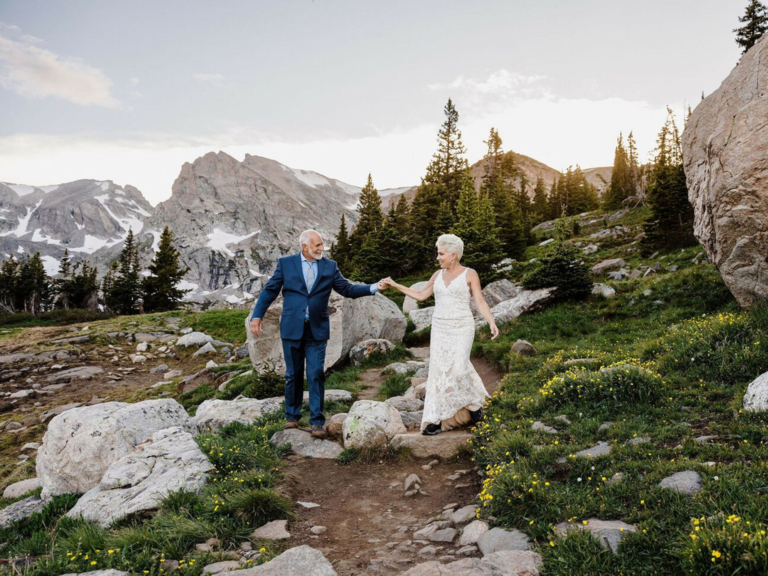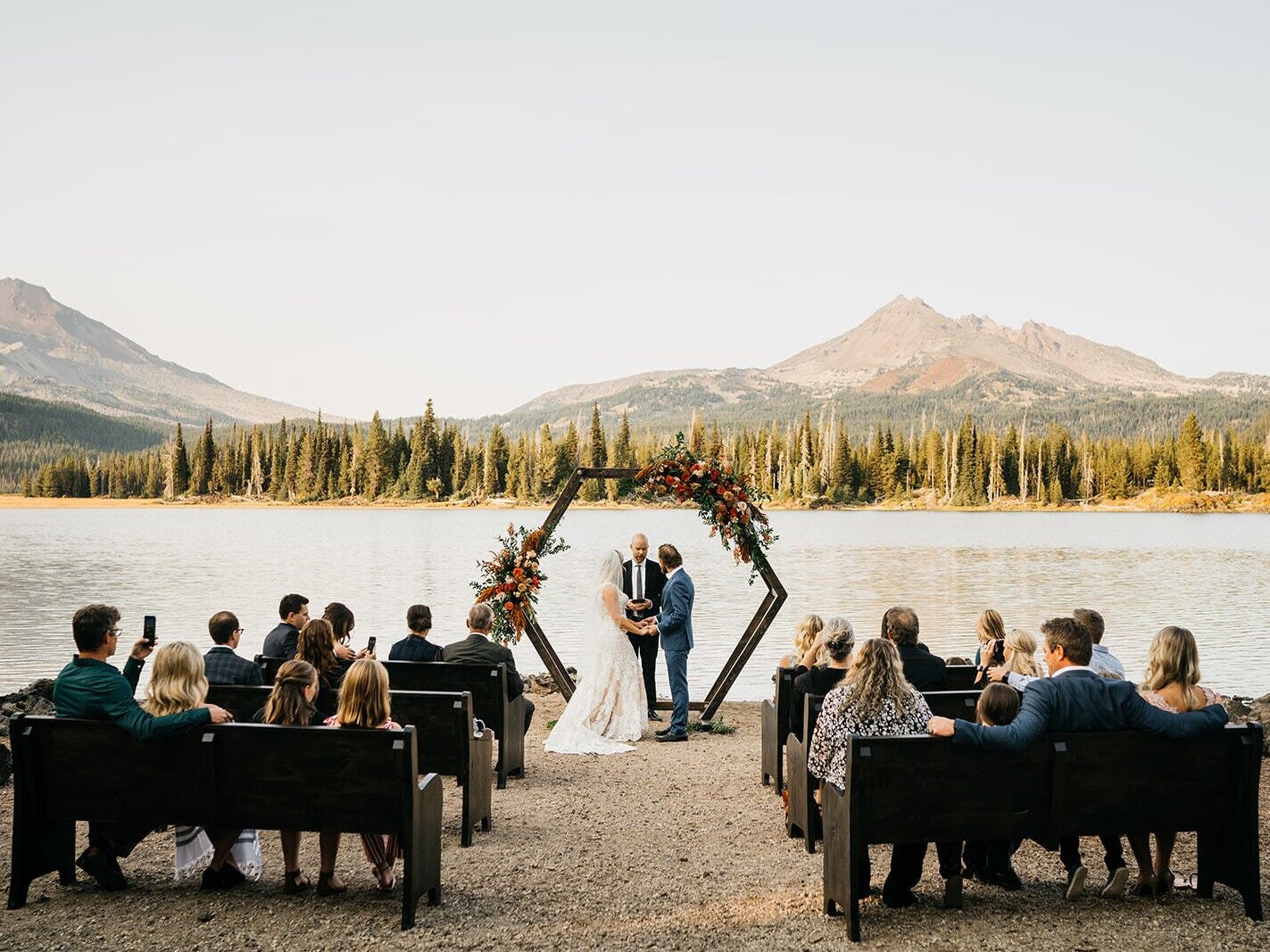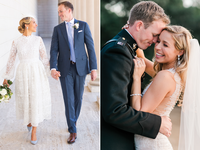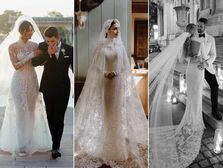Everything You Need to Know About Planning a Second Wedding
Most people don't expect to find themselves planning a second marriage. There's the whole "you only get married once" adage, but according to The Knot's Real Wedding Study, 9 percent of respondents were hosting their second wedding (or third or fourth!).
When a first marriage ends, most consider themselves lucky to find love with someone new—and that love should certainly be celebrated! That's why wedding planners thoroughly enjoy planning a couple's second wedding. "When couples plan their second wedding, they tend to have more of a desire to create something that feels really truly unique to them, and to have the wedding they really want," says Jamie Chang, owner and destination wedding planner at Mango Muse Events in Los Altos, California. "Because you have knowledge of what your wedding was like the first time, you're more aware of what can go wrong and what really matters to you, so you tend to be more focused as you know what you want."
Along the process of crossing things off your wedding planning checklist, you might be wondering what you should be doing differently when it comes to your second wedding. If that's the case, here are some expert-backed second wedding etiquette tips and ideas that will help you nail the big event and ensure that it's just as you hoped it would be.
In this article:
Second Wedding Etiquette
As the same with first weddings, second weddings should be in line with your values and what you hold to be most important as a couple. That being said, there are some wedding etiquette factors that would be helpful to consider.
Respect guests' availability (or lack thereof).
Understand that your guests may have less availability than they did when you were married the first time around—potentially due to having kids, extracurricular activities, intense careers, and limited vacation time, explains Kathryn Cooper, owner and photographer of Kathryn Cooper Weddings. "Not everyone can get time off for your wedding," she says. "Letting people know your wedding date as early as possible is key so that folks have advance warning and can plan accordingly."
Come to an agreement on desired traditions.
Holly Gray, owner of Anything But Gray Events, recommends acknowledging the wedding traditions you want or don't want with your new partner. "Something that might have been done at your first wedding, like a bouquet toss or a religious reading, might not be something you want to incorporate in your second wedding for a variety of reasons," she says.
Create the guest list you actually want.
When you had your first wedding, you may have invited certain people out of respect, or perhaps even because one of your family members asked you to. The beauty of your second wedding is that you get a redo. "A second wedding can be free of any constraints with the guest list," says Cathy O'Connell, co-founder of COJ Events. "Whether you want to have 400 people or 50 people, there is no one to please but themselves."
Choose toasters thoughtfully.
Sarah Chianese, owner, planner and executive chef of Mangia and Enjoy!, urges couples planning their second wedding to choose who speaks during the toasting very carefully. "Discussing expectations, and even fears, of mentions of the prior spouses should be avoided, for example," she says. "Discuss this amongst yourselves, including any and all concerns, then make your choices to invite your speech makers and review your concerns with them, as well."
Wear what you want.
Yes, there's that old "rule" that brides can't wear white or a veil for a second wedding, but you should wear whatever makes you feel most comfortable and confident. If that's a traditional white wedding gown and veil, go for it. If it's something completely different, like a colored wedding dress or a jumpsuit, that's totally fine, too.
What Is the Gift Etiquette for a Second Wedding?
Believe it or not, but gift-giving is more optional for second weddings, according to Cooper. "While those having first weddings are moving in together, starting a home, going on a big trip, and having firsts for experiences, second weddings are usually for couples who already own essentials—and oftentimes, homes," she says. "Etiquette is generally nothing, money, or something that is meaningful to the friendship, such as a commissioned painting of the couple."
Who Pays for What for a Second Wedding?
With a first wedding, the bride's family traditionally covers the cost of the wedding, with the groom's family picking up the bill for the rehearsal dinner and/or brunch. With a second wedding, on the other hand, it's most often paid for by the couple, explains Chianese, particularly if they have both had previous marriages to someone else and their respective parents already contributed to their first weddings. "With traditions changing, it is something to be discussed between the couple and amongst their parents as the families may base it more on financial ability, more so than standard gender roles," she adds.
Can You Have Prewedding Events for a Second Wedding?
It's less common for couples planning second weddings to have additional events such as a bridal shower, bachelor or bachelorette parties, or engagement parties. "Couples forgo those 'additional' celebrations in favor of focusing on the wedding celebration itself," says Gray. "Keep in mind, traditionally, those are all additional events thrown by friends or family members, and to assume they are able or willing to throw them a second time around is presumptuous."
Who to Invite to a Second Wedding?
Second weddings tend to be smaller and more intimate in nature than first weddings, however, it's completely up to the couple to decide who to invite to their wedding. That being said, Chianese recommends against inviting exes to your wedding unless you're very close and on good terms. "Inviting exes and their families also invites potential discomfort, misunderstandings, and hurt feelings, which is best to avoid on your happy day," she says. "If there are guests who have any malevolence towards your union or hold a grudge for the dissolution of your prior marriages, it's best not to invite them to the wedding." If you're looking for help creating your guest list, try The Knot's free Guest List Tool.
Should You Create a Registry?
Since, most of the time, couples who are getting married for the second time have already moved in together, it's not widely common to have a traditional wedding registry that includes things like towels and kitchen appliances. That being said, you could opt to do a creative registry for something you want—or for a charity, suggests O'Connell.
How to Plan a Second Wedding
If this is your second marriage, here are some important second wedding ideas experts recommend for the planning process.
Spend time selecting the right attire.
Chances are that you went more traditional for the first wedding with a white gown (or tux), so you might be tempted to switch things up this wedding. While you certainly can do the same for this wedding (there is nothing wrong with wearing white for a second marriage), Chang explains that your second wedding presents a new opportunity to choose something different—be it a different style gown or maybe a pants suit instead. "The most important thing to remember is to choose something that you feel comfortable in and that makes you feel good and beautiful," she adds.
Create your own ceremony.
Often with second weddings, brides are not "given away" by their families, as they traditionally are in a first wedding, explains Kate Reavey, owner of Chicago Vintage Weddings. "Ceremony processionals tend to be more understated," she says. "What I find is that couples prefer to carve out a fresh direction for their second wedding ceremony so it feels entirely different from the type of ceremony and wording they used the first time around."
Consider writing your own vows.
With your first wedding, you may have opted out of writing your own vows, but you may feel differently this time. Maybe it's because your current soon-to-be spouse and your connection to this person just means so much more to you—or because you wished you had written your vows the first time. Similarly to first weddings, Chang recommends that the words you choose for the wedding itself, your vows and even your pronouncement reflect your relationship and values. "With second marriages, in particular, it's good to acknowledge what's so special about this person and this relationship," she says. "This is when personal vows or a story told by the officiant can really help to share that love."
Consider your invitation wording.
One of the more sensitive pieces about planning a second wedding, according to Chang, are the invitations. "As you are typically older when getting married for the second time (or third, fourth, etc...), you want to make sure your invites reflect the wedding you're having," she says. "That means not including your parents on the invitation as typically they won't be paying for the wedding." She recommends that you choose invitations that are truly coming from you and your partner and give guests the 411 they need to know about what kind of an event it will be (black tie, casual, etc.).
Decide whether or not you're accepting gifts.
Gift etiquette can be a more sensitive area of planning a second wedding. "As you've been married before and had a wedding, you also likely got gifts once already," says Chang. "At least a portion of the guests will be similar to your first wedding, so asking for gifts for a second marriage can be a little tricky." If you prefer to leave it up to your guests, you don't have to make a mention of gifts on the invitation—simply let your guests give whatever they feel is right. But if you do want to tell guests "no gifts" or opt for a charity donation, be sure to include it on your invitation
Incorporate your children if either or both of you are parents.
"Blending families can be tricky, so it's important to make your kids feel as if they are being treated respectfully and given choices," says Reavey. "Age-appropriate roles should be assigned—such as junior bridesmaid or maid of honor (with limited responsibility), for example—for older children." Whatever you do, be sure to ask your children which roles and responsibilities they feel most comfortable with. "Some may wish to stand with you or to give a reading, while others are shy and prefer to stay behind the scenes a little more," adds Reavey.
























